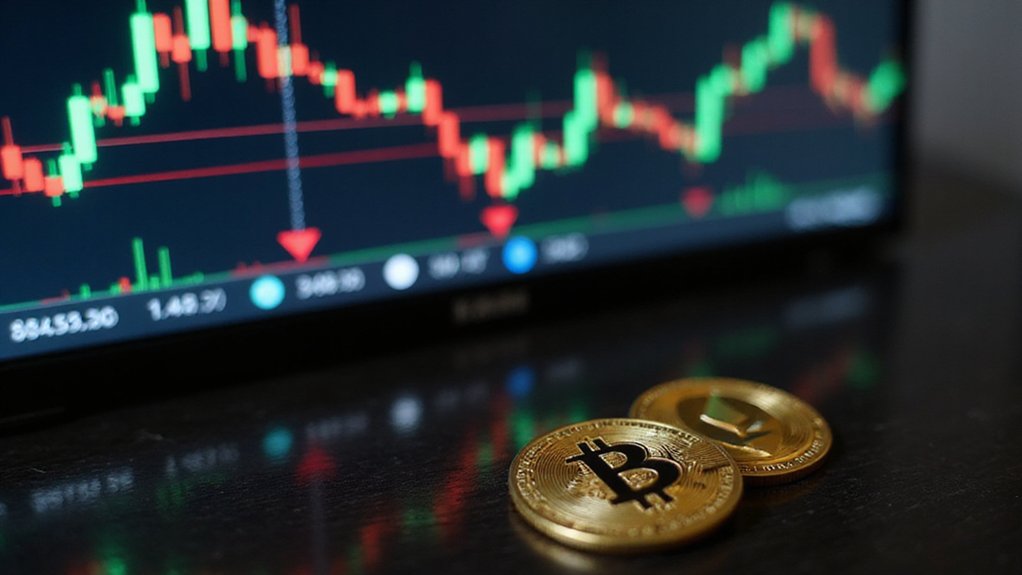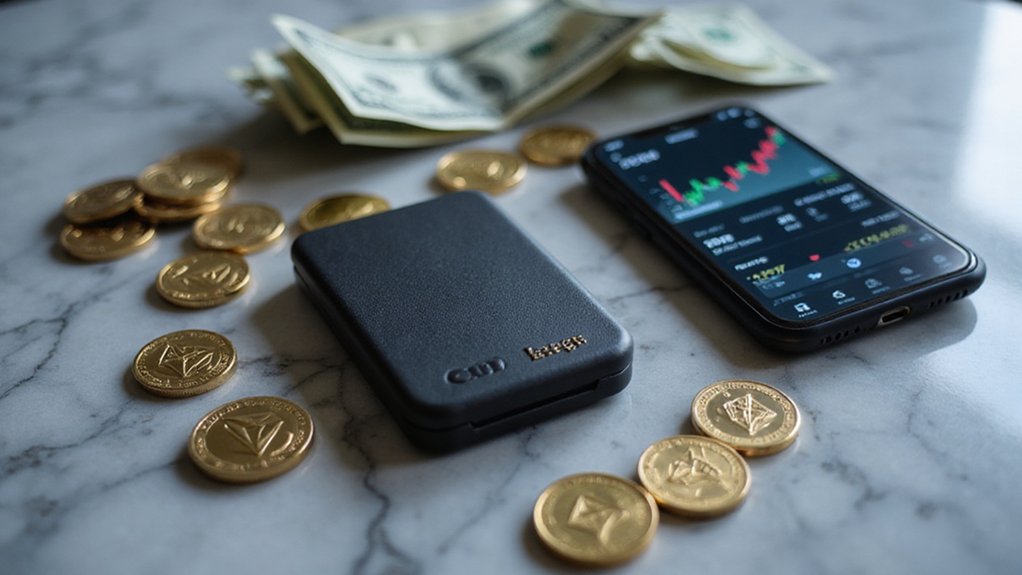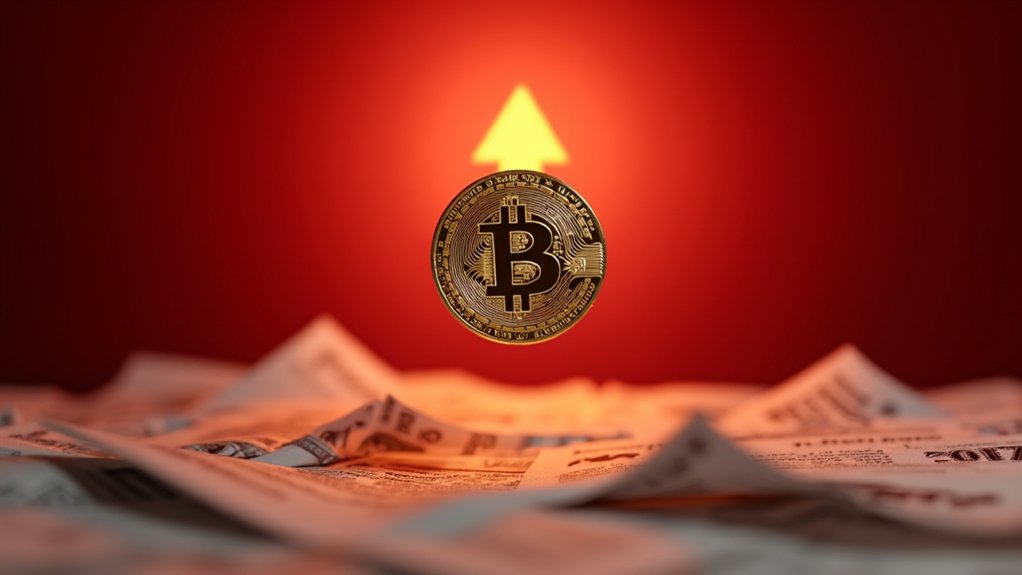Cryptocurrency trading combines extreme market volatility with regulatory ambiguity, cybersecurity vulnerabilities, and liquidity constraints that can transform fortunes into footnotes overnight. A single tweet can evaporate billions while platform suspensions trap funds during critical moments. Traders face sophisticated phishing schemes, irreversible transactions without consumer protections, and emotional stress that impairs decision-making during panic selling cycles. Annual theft figures reach billions, highlighting risks that traditional markets—with their quaint circuit breakers and deposit insurance—simply cannot match. The complexities multiply exponentially beyond these surface-level concerns.

How does one adequately prepare for a market where a single tweet can evaporate billions in value overnight?
Regulatory frameworks shift like sand dunes, and the very platforms promising revolutionary financial freedom might disappear along with user funds?
The cryptocurrency trading landscape presents a fascinating paradox: an asset class built on mathematical precision and cryptographic certainty that operates in an environment of unprecedented volatility and regulatory ambiguity.
Price swings that would trigger circuit breakers in traditional markets represent merely another Tuesday in crypto markets.
These extreme fluctuations stem not from fundamental valuation models but from social media sentiment, celebrity endorsements, and news cycles that treat speculative assets like cultural phenomena.
The emotional toll on traders proves substantial, with panic selling and euphoric buying creating feedback loops that amplify already dramatic price movements.
Research indicates that confirmation bias significantly influences cryptocurrency traders’ decision-making processes, causing them to seek information that supports their existing beliefs while ignoring contradictory evidence.
Liquidity challenges compound these volatility concerns.
Platforms may suspend trading during critical moments—precisely when access matters most—while withdrawal restrictions emerge during periods of regulatory uncertainty or technical instability.
Smaller altcoins face particularly acute liquidity constraints, with bid-ask spreads widening dramatically during market stress.
Cybersecurity threats loom perpetually over the ecosystem.
Annual theft figures reaching billions underscore the harsh reality that irreversible transactions, while technologically elegant, offer no recourse for victims of sophisticated phishing schemes or platform breaches.
The decentralized ethos that attracts many participants simultaneously eliminates traditional consumer protections.
Regulatory uncertainty creates perhaps the most insidious risk.
Enforcement actions can materialize suddenly, transforming legal trading activities into prohibited conduct overnight.
The compliance burden falls entirely on individual traders maneuvering a patchwork of jurisdictional requirements that evolve faster than most can track.
Platform risks add another layer of complexity.
Many exchanges operate in regulatory gray zones, offering limited transparency about their financial health or operational practices.
The absence of deposit insurance—standard in traditional banking—means platform failures result in total loss rather than inconvenience.
Unlike traditional currencies that enjoy government backing, cryptocurrencies operate without central bank support, leaving traders exposed to institutional vulnerabilities.
The psychological dimension often receives insufficient attention.
Market volatility creates sustained stress that impairs decision-making precisely when clear thinking becomes most critical.
Traders must simultaneously master technical analysis, regulatory compliance, cybersecurity best practices, and emotional regulation—a skill set that would challenge Renaissance polymaths.
Sophisticated criminals deploy spear phishing techniques that target individual crypto traders using their personal information to gain access to wallets and exchange accounts.
Frequently Asked Questions
How Much Money Should Beginners Invest in Cryptocurrency Trading?
Beginners should limit initial cryptocurrency investments to amounts they can afford to lose entirely—typically 1-5% of their total investment portfolio.
Starting with $100-500 allows newcomers to experience market volatility without catastrophic financial consequences.
This modest allocation enables learning through actual trading while minimizing exposure to crypto’s notorious price swings.
Dollar-cost averaging through small, regular purchases often proves more prudent than substantial lump-sum investments for inexperienced traders.
Which Crypto Exchanges Are the Safest for New Traders?
For newcomers steering cryptocurrency’s occasionally treacherous waters, Coinbase and Gemini emerge as the sensible choices—offering user-friendly interfaces, robust security protocols, and regulatory compliance that actually means something.
Kraken appeals to those craving slightly more sophistication, while Binance.US provides cost-conscious trading (assuming one doesn’t mind steering its labyrinthine fee structure).
Each maintains cold storage and encryption standards that would make traditional banks envious, though that bar admittedly sits rather low.
Can I Recover Losses if a Cryptocurrency Exchange Gets Hacked?
Recovery prospects following exchange hacks remain frustratingly inconsistent, with outcomes largely dependent on the platform’s financial health and regulatory jurisdiction.
While Coincheck admirably compensated users from its own reserves after the $534 million theft, Mt. Gox creditors endured a decade-long bankruptcy process.
Users face stark reality: no universal insurance scheme exists, making exchange selection—as previously discussed regarding safety considerations—critically important for protecting one’s digital assets from institutional failures.
What Tax Implications Should I Consider When Trading Cryptocurrencies?
Cryptocurrency trading triggers capital gains tax on every disposal—sales, trades, even purchasing coffee with Bitcoin.
Short-term holdings (under one year) face ordinary income rates up to 37%, while long-term positions qualify for preferential rates of 0-20%.
Mining and staking rewards constitute taxable income upon receipt.
The IRS requires meticulous record-keeping of cost basis, dates, and proceeds for each transaction.
Starting 2025, exchanges will issue Form 1099-DA, making compliance tracking considerably more straightforward.
How Do I Protect My Crypto Assets From Theft or Scams?
Protecting cryptocurrency assets requires a multi-layered approach combining offline storage solutions with rigorous security protocols.
Cold wallets and hardware devices eliminate online vulnerabilities, while two-factor authentication and strong passwords create additional barriers against unauthorized access.
Regular monitoring for suspicious activity, using multiple secure wallets to distribute risk, and maintaining heightened awareness of phishing schemes prove essential.
Physical security measures—storing hardware wallets in safes—complete this defensive strategy against increasingly sophisticated threats.









